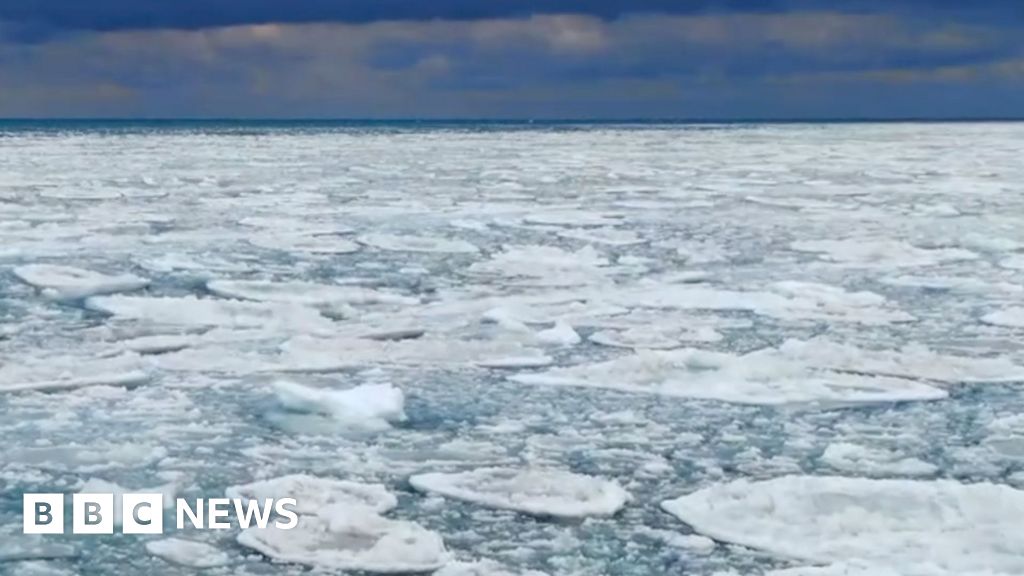ARTICLE AD BOX
Watch: Surfers perform “paddle-out” ceremony as tribute to tourists found dead in Mexico
By Will Grant
BBC Central America correspondent
The tight-knit and peaceful surfing community in the Mexican port of Ensenada is in shock.
Three foreign surfers - two Australian brothers, Callum and Jake Robinson, and their American friend, Jack Carter Rhoad - had been in the town just a few days earlier, enjoying some of the finest surfing spots in North America at the start of what was supposed to be the trip of a lifetime.
Now, their bodies are being repatriated to their families after they were brutally murdered at a camping site.
They were planning to take a well-worn route, setting out from Ensenada, surfing and camping along the Pacific coast, and arriving in Rosarito further north. Unfortunately, they never made it to their accommodation.
Instead, several days later, their bodies were found down a well several kilometres from the camping site, their burnt-out pick-up truck found nearby. Each man had been killed by a gunshot to the head, the authorities said, sending a chill through the local surfing community.
Jake and Callum Robinson went missing in Mexico with their American friend, Jack Carter Rhoad
The implications of the violence are still reverberating through the quiet beach-town.
"It's difficult. In truth, I've always felt safe here," said Jessica, an American from San Diego now living near Ensenada, her wetsuit still dripping from a morning surf.
A well-worn path through a surfer's paradise
At various times in its 500-year history, Ensenada has teemed with visitors from the United States. During the years of Prohibition in the early 20th Century, the city's economy received a particular boost from Americans coming south in search of legal liquor.
Today, it's the third biggest city in the state with both a booming tourist industry and a thriving ex-pat community. Thousands of foreigners - from silver-haired retirees to digital nomads - have settled in the city to enjoy its beachfront properties, warm climate and relaxed atmosphere amid the rising cost of living in the US.
And, of course, it attracts huge numbers of surfers every year.
Image source, Getty Images
Image caption,The surfing community held a "paddle-out" in Ensenada on Sunday in memory of the murdered men
The region of the Bay of All Saints (Bahia de Todos Santos in Spanish) as a whole is a surfer's paradise. Spots like San Miguel Beach and Todos Santos Island are renowned among the surfing community with a major competition, the Billabong XXL, having been held in the latter.
So, the chances are that the three murdered men had little or no trepidation about embarking on their trip. And few among their fellow-surfers will have necessarily warned them against it beyond urging them to be careful.
Jessica, the American from San Diego, said that she had come to the beach town to surf with her husband. They run programmes for young people in the "really cool, really friendly" local surfing community.
"Obviously, we take precautions and investigate carefully where we're going before we go. But it's so beautiful here and the people here are so kind, we intend to surf the whole coast while we live here," she said.
Image source, Instagram/@Callum10Robinson
Image caption,Callum Robinson posted this image of Jack Carter Rhoad just days before his death
An undercurrent of violence
Some Mexican surfers put the murders into the context of the region's constant violence.
While the young men never expected to meet such a grisly fate simply by pursuing the thing they loved, their murders are a stark reminder of the degree of criminality in Mexico's northern states.
"This is the struggle, and it is important that it's not a silent one. We have to continue to draw attention to these problems, continue to protest and march, keep raising our voices and call for an end to the impunity," Paulina Rodriguez, a surfer and resident of Ensenada, told the BBC.
Powerful drug cartels are engaged in a territorial war over "plazas" - the drug-smuggling and people-trafficking routes north, with illegal guns also being moved southwards. It is all a multi-billion industry for the cartels which operate along the border, and foreigners have run afoul of organised crime in Mexico on numerous occasions.
Francisca Acosta, a younger Mexican surfer, echoed the concern that impunity for violent crime is rife in Mexico.
"(The killings) speak to a greater problem in Baja California and across Mexico," she said with a sigh. "There's a huge problem with impunity. The disappearances and violent crimes are getting ever closer to home."
The country's poorest are the most vulnerable, she said.
"If this can happen to tourists, it can happen to anyone," she added. "As organised crime is on the rise in society, you can feel the fear on the streets."
Image source, Instagram/@Callum10Robinson
Image caption,Callum Robinson had played on Australia's national lacrosse team
Inside the impact zone
There has been some swift action by local authorities after the surfers' deaths.
Three people have been arrested in connection with their murders, including a woman who was in possession of one of the men's mobile phones.
The working theory of the state authorities in Baja California is that the detainees had tried to steal the group's vehicle, possibly for its tyres. But, on meeting resistance, the attackers killed them before burning their tents and trying to hide the bodies.
The state attorney general, Maria Elena Andrade Ramirez, said that her office would carry out an exhaustive investigation of "these unfortunate events until those responsible feel the full weight of the law".
Image source, Instagram/@AugustusPeebly
Image caption,Jake Robinson was about to take a job at a hospital in Australia
In some respects, the violent events in Baja California are reminiscent of the kidnapping of four Americans - two were murdered - last year in Matamoros, in Tamaulipas state.
Like the murder of the surfers, it garnered similar international media attention that forced authorities to act quickly.
It also earned some disquiet expressed on social media platforms about the speed and extent of the operation to find these tourists when there are an estimated 100,000 people considered missing in Mexico - many of whom will also have been dumped in shallow graves in the country's seemingly endless drug war.
Yet such complaints fail to account for the behind-the-scenes diplomatic pressure being exerted on the Mexican government by its partners, in this case, Australia and the United States.
In turn, Mexico's federal government may have put pressure on the local authorities to act quickly. The media scrutiny, with journalist teams from Australia and the US descending on Baja California, also heaps greater urgency on the authorities to act and, although it's unlikely to be expressed publicly during this investigation, the potential effect on tourism of such negative and violent headlines may well be at play in bringing about a swift resolution.
Away from such cold political considerations, the surfing community held a "paddle-out" in Ensenada in memory of the murdered men.
It was a dignified, heartfelt goodbye in the same waters in which they had caught some of their final waves, before being submerged into Mexico's violent criminality, which has dragged so many other victims under before them.
Additional reporting by Ivan Gallardo in Ensenada

 8 months ago
25
8 months ago
25








 English (US) ·
English (US) ·